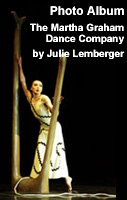
 |
 |
 |
 |
 |
 |
Go back to Flash Reviews The Menagerie Reflects; Rizzo Reduces; Toumanova at the Front By Paul Ben-Itzak PARIS -- This is a movie town, where film, like dance, is more affordable and thus a bigger part of the cultural mix for more people. Four or so times per year, prices city-wide are reduced to 3 Euros (or about $3.60) a pop, most theaters offer discounted tickets for adherents, regular admission at the Cinematheque Francais is under $6, and your $50 yearly membership at the Pompidou Centre includes free admission to its film festivals, essentially a second national cinematheque. In the summer, the parc at La Villette, showing free films on a giant inflatable screen, is a popular picnic destination, while another festival shows films, also for free, at sites that feature in them. So it's not surprising that for its new work created in residency at the Menagerie de verre to open the recent Inaccoutumes (or Unaccustomed) festival, the collective Fin Novembre should have chosen to try to create a bridge between dance and film. Also not surprising, considering the virtual embargo here on most of the dance waves created in the US over the last 20 years, is that the ground tread is not as new as the creators might think it is. I'll admit to chuckling when two of the female dancers mimicked, live and on a screen at the back of the Menagerie's cavernous basement space, an excerpt (also screened for us) of Bruce Lee battling Kareem Abdul-Jabbar in "Game of Death," Lee's final film. Their filmed encounter, a battle royal around the ivory environs of the Menagerie, was particularly drolly executed, a relief from much of the unengaged post-modern dancing I see here. But when Rachid Ouramdane started providing the high-pitched grunting for their real-time duel, I had to roll my eyes; Doug Elkins was doing this 15 years ago. But don't hold your breath for Elkins to be invited to the Menagerie de verre, the Rencontres Choregraphiques Internationales de Seine-Saint-Denis, or any of the other festivals in the Paris area, which rarely expose French audiences to anything that's happened in American dance since Bill T. Jones. This gap is French presenters' and tour funders' prerogative, of course. But I think it's fair to consider the ramifications of the French exclusion when reviewing dance productions or venues that purport to be experimenting with new forms, and in so doing seem unaware that American artists have been delving into those forms for a long time. It's a provincial sort of experimentation, showing things new to them but not necessarily to the form. One might well ask, where were Fanny De Chaille, Nicolas Floc'h, Sophie Laly, Julie Nioche, Rachid Ouramdane and Emanuele Quinz (the creators and interpreters of this piece) when Doug Elkins was Kung Fu Fighting? There was true novelty on this first program in this fall's Inaccoutumes festival, and Ouramdane figured in that, too, delivering a virtuoso performance in precision in Christian Rizzo's "Skull Cult." The cloying sub-title to this piece, created in 2002, is "An invitation from Rachid Ouramdane to Christian Rizzo; a proposition from Christian Rizzo for Rachid Ouramdane." Considering that "Skull Cult" premiered outdoors at the summer festival in Avignon, this proposition included the cruel proviso that the performer be clad in dark leather from ankle to neck, a motorcycle helmut, and cloth covering his face. The movement is of the type that's challenging for me to do justice to as a reviewer, but I'll try: It was small, restrained but tense, controlled and arrested. Movement of this tempo is sometimes called "Butoh-like," but when I think Butoh, I think serenity, or at least calm, and this was coiled. I formed the impression of a brother from another planet adjusting to our different gravity, essaying to find his body again, or maybe trying to shed his skin. The music, also sparingly used, was chiefly The Mamas and the Papas' "California Dreaming," piped in as if from remote about two-thirds into the piece, and then repeated in segments. Usually it's difficult for me to watch dances performed largely in aural silence, but the timing of this cue, its far-away lyrics and its far-away volume worked as a tonic to the performer's tension. Alternately, you could see it -- the remote aspect of the music -- as the muted way the performer/character might have been hearing it from under his heavy gear or distant planet. Peck plays the leader of a group of Soviet peasants fighting a rear-guard action against Nazi troupes in Russia. Toumanova's character is a famous ballerina on her way to tour the front when she gets lost and rescued by a member of the resistance cadre. Thus, one of Gregory Peck's first lines on the screen, when he's informed who's coming to dinner, is "Just what we need here: a dancer." Toumanova proves him wrong, of course. She ends up shooting a German soldier who discovers the underground hide-out just as she's about to give an impromptu performance, and goes down fighting by Peck's side, swearing allegiance to the Soviet army and her wedding oath to him, in that order. "Days of Glory," starring Tamara Toumanova and Gregory Peck, repeats this Sunday at 5 p.m., January 3 at 3 p.m., and January 11 at 6 p.m. at the Pompidou Centre. |
|||||||


